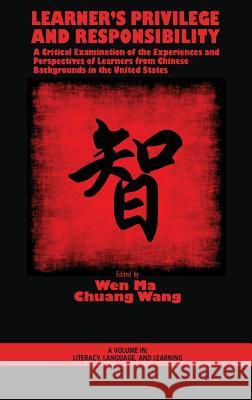Learner's Privilege and Responsibility: A Critical Examination of the Experiences and Perspectives of Learners from Chinese Backgrounds in the United » książka
Learner's Privilege and Responsibility: A Critical Examination of the Experiences and Perspectives of Learners from Chinese Backgrounds in the United
ISBN-13: 9781623965907 / Angielski / Twarda / 2014 / 270 str.
Learner's Privilege and Responsibility: A Critical Examination of the Experiences and Perspectives of Learners from Chinese Backgrounds in the United
ISBN-13: 9781623965907 / Angielski / Twarda / 2014 / 270 str.
(netto: 519,03 VAT: 5%)
Najniższa cena z 30 dni: 541,82 zł
ok. 13-18 dni roboczych.
Darmowa dostawa!
A volume in Literacy, Language, and Learning Series Editors Claudia Finkbeiner, University of Kassel; Althier M. Lazar, Saint Joseph's University and Wen Ma, Le Moyne College This book is about the learner sideof the teaching and learning equilibrium, centering on the educational experiences and perspectives ofChinese students in the United States. These students ranged from kindergarteners, adolescents, undergraduate, graduate, toadult learners, across the educational spectrum. Because Chinese students are the largest cohort among all international students in the U.S., and their prior educational experiences and perspectives in China are so different fromthose in the U.S., exploring who they are, what their learning experiences have been, and how their learning needs can be met, may notonly help us better understandthese culturally different students, but also allow U.S. educators to teach them more effectively. The chapters in the book examine the constructs of learner privilege and responsibilityin the teaching and learning equation, cultural and linguistic challenges and transitional adjustments, self-concept, learning strategies, comparison and contrast of differences and similarities between Chinese and American students, and/orcritical reflections on significant issues confronting Chinese learners. While each chapter is situated in its own research literature and connects with its own teaching and learningpractices, all of them are united around the overarching themes of the book: the experiences and perspectives of diverse learners from Chinese backgrounds in the United States. The chapters also flesh out some of the larger theoretical/ pedagogical issues between education in China and in the United States, provide useful lenses for rethinking about and better understanding their differences and similarities, as well as offer pertinent suggestions about how the educational communities in both countries may benefit from learning about and from each other.











